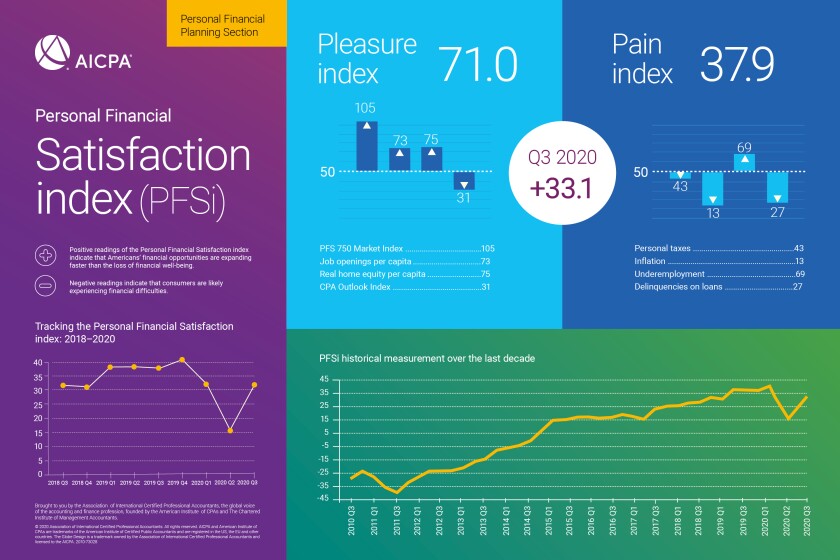Financial satisfaction of people in the U.S. rebounded strongly in the third quarter of the year, according to a new survey by the American Institute of CPAs, reversing the lows in the second quarter in the midst of the recession brought on by the novel coronavirus pandemic.
The AICPA’s Q3 2020 Personal Financial Satisfaction Index measured 33.1, representing a whopping 99 percent (16.5 point) increase from the previous quarter. That’s the biggest quarterly increase in the 27-year history of the PFSi, and a complete turnaround from the second quarter, when the index had its largest ever quarterly drop.
Jenn Graham is the Founder and CEO of Inclusivv, dedicated to helping organizations transform from a culture of monologue to a culture of dialogue. By providing facilitator training and structured peer-to-peer conversations, Inclusivv helps leaders harness the power of conversation to shape environments where respect, trust, and creativity flourish. Since founding Inclusivv, Jenn has built a digital platform, a content library of over 50 topics, and a variety of trainings that have enabled tens of thousands of people to gather for conversations around the world – both in person and online on the most important issues of our time.
Bradley Niedzielski is an audit and assurance partner at Deloitte & Touche LLP based in Deloitte's New York office who has served a variety of complex global financial services clients across both the public and private sectors for over 20 years.
Brandon Chandler is an audit and assurance partner at Deloitte & Touche LLP. As the leader within the accounting advisory & transformation services practice in Atlanta/Birmingham, he oversees all aspects of the Atlanta/Birmingham AATS practice including quality, innovation, growth and talent strategies.
The PFSi is built around various factors, including the labor market. The gains can be mainly attributed to improvements in job openings per capita and underemployment. Those had the biggest impact on increasing the overall PFSi. The biggest factor driving the quarter-over-quarter rally was a 35 percent (37 point) decrease in underemployment. A decrease in underemployment improves overall financial satisfaction in the index. While there was an improvement in underemployment in the third quarter from Q2’s record high, it’s still 117 percent above its level a year ago. For the second consecutive quarter, underemployment is still the biggest negative contributor to the average American’s personal financial satisfaction. The Q3 underemployment level reflects data measured through the middle of September.
“As Americans continue to navigate the economic impact of the COVID-19 pandemic, it is important to remember that the fundamentals of financial planning haven’t changed,” said AICPA PFS Credential Committee chair Dave Stolz in a statement Thursday. “Though the stock market’s record performance is encouraging, 2020 has served as a reminder of the volatile nature of markets. As the impact of COVID-19 continues to play out across the country, investors should weigh their risk tolerance and ensure they have ample cash on hand. Further, a tax-efficient financial plan that includes a diversified portfolio can give confidence that long-term financial goals will remain within reach through this period of extreme uncertainty.”
The coronavirus put millions out of work, prompting job openings per capita to show a record plummet earlier this year. In the third quarter, job openings started to recover, climbing 37 percent (20 points) compared to Q2. That factor is now only 10 percent below its measurement a year ago before the pandemic. The Q3 index comes from July data from the U.S. Bureau of Labor Statistics.




